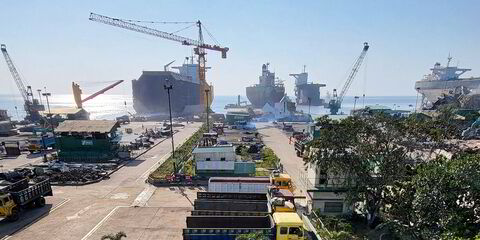Ocean Yield is trumpeting a first-of-its-kind, emissions-linked charter deal for a quartet of LR1 newbuildings.
The Norwegian company announced on Tuesday that it has commissioned four product tanker newbuildings backed by long-term charters with rates determined by the ships’ Carbon Intensity Indicator rating — to its knowledge the first charters with such a feature.
“This is a little bit of a new way of approaching leasing,” Rode told TradeWinds. “We’re incentivising the end user to obtain the best possible rating.”
The charters are expected to add approximately $300m to Ocean Yield’s Ebitda backlog.
The four ships will be built at Guangzhou Shipyard International in China for delivery in 2026 and 2027.
They will be ready for dual-fuel conversion upon delivery with methanol as the second fuel.
Once they hit the water, the ships will go on 15-year bareboat charters to Sao Paulo-based Braskem.
The four ships join two other Ocean Yield vessels — a pair of dual-fuel 36,000-cbm ethylene carriers set for delivery in 2024 and 2025 — under construction for the New York-listed petrochemical producer.
“In Braskem, we have found a partner who shares our values and ambitions,” Rode said in a statement announcing the deal.
“We are excited to build on our relationship with Braskem and introduce the inaugural sustainability-linked lease to the Ocean Yield portfolio.”
Ocean Yield has made other moves in the methanol-fueled ship space, buying two under-construction ships ready for methanol fuel with one set for a seven-year charter with Zim.
The IMO implemented the CII system on 1 January, with ratings coming next year.
Each ship in the global fleet will receive a rating from A to E, where A is the best and E is the worst.
A ship with an E rating for a single year or a D rating for three consecutive years will need to submit a plan on how it will obtain a C rating.





